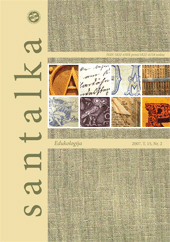Korupcija bendrojo lavinimo vidurinėje mokykloje: sociologinė diagnozė ir edukacinės įžvalgos
Corruption in a Comprehensive School: Sociological Diagnosis and Educational Providence
Author(s): Valdas PruskusSubject(s): Social Sciences
Published by: Vilnius Gediminas Technical University
Keywords: corruption; school; schoolchildren; teachers; parents; gifts; education.
Summary/Abstract: The article is about the phenomenon of corruption in a comprehensive school. It analyses the expression forms of corruption and their peculiarities and disputes the main reasons stimulating educators to take part in corrupt interchanges thus tolerate it. On the ground of empirical research in Vilnius secondary schools it discloses attitudes of teachers, schoolchildren and parents towards corruption. The research was carried out in Vilnius Salomėja Nėris gymnasium, Vilnius Mikalojus Daukša secondary school, Mindaugas secondary school, Užupys gymnasium, Antakalnis gymnasium, Naujamiestis secondary school and Stanevičius secondary school. Overall 500 respondents were questioned: 300 pupils of ninth – twelfth forms, 100 teachers and 100 parents of schoolchildren. Difficult financial circumstances were pointed out as the main reason stimulating teachers to take part in corrupt interchanges. This answer was chosen by 42 per cent of respondents. Most of them think that raising wages would reduce corruption crimes. The research data show it is an important problem in schools though 70 per cent of respondents state it is not the biggest problem in their school. Only 15 per cent of questioned schoolchildren, 4 per cent of parents and 14 percent of teachers safely state that corruption is the main problem in their school. About 20 per cent of respondents (21.4 per cent of schoolchildren, 19 per cent of parents and 21 per cent of teachers) acknowledge of making a payoff or receiving an offer to take it. Respondents state that 30 per cent of their friends and relatives made a payoff to school staff. 26.7 percent of schoolchildren and 27 per cent of parents’ acquaintances made a payoff to school staff. Only the answers of teachers did not change – 21 per cent of their colleagues were offered a payoff. Respondents in secondary schools attribute “a payoff and direct payout”, “presents seeking benefit” and “buying of tests and examinations’ questions and answers which are distributed by teachers” to corrupt actions. In the light of these research data particular measures reducing corruption are offered.
Journal: Santalka: Filologija, Edukologija
- Issue Year: 15/2007
- Issue No: 4
- Page Range: 75-93
- Page Count: 19
- Language: Lithuanian

